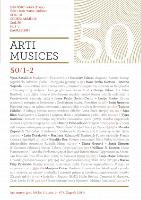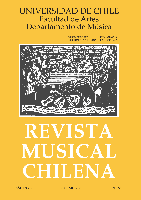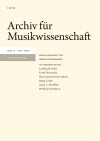
Jazz Research Journal
Scope & Guideline
Unveiling the Rich Tapestry of Jazz Research
Introduction
Aims and Scopes
- Cultural and Historical Analysis:
The journal emphasizes the importance of examining jazz music within its cultural and historical contexts, exploring how social movements, historical events, and cultural exchanges have shaped the evolution of jazz. - Interdisciplinary Approaches:
The journal welcomes contributions from various disciplines, including musicology, sociology, gender studies, and environmental studies, reflecting the diverse influences and interpretations of jazz. - Inclusivity and Diversity:
A core focus is placed on inclusivity and diversity in jazz, addressing issues related to gender, race, and representation within the jazz community and scholarship. - Innovative Practices:
The journal encourages discussions on innovative practices in jazz, from improvisational techniques to the integration of technology and environmental considerations in jazz production. - Critical Engagement with Jazz Media:
The journal examines jazz in various media forms, including literature, film, and visual arts, highlighting the interplay between these mediums and jazz music.
Trending and Emerging
- Gender and Jazz:
Recent publications indicate a growing interest in gender dynamics within jazz, including discussions on representation, inclusivity, and the contributions of women in the jazz sphere. - Environmental Considerations:
The journal is increasingly addressing the environmental impacts of jazz production and consumption, highlighting the need for sustainable practices within the music industry. - Afrofuturism and Cultural Identity:
Emerging themes around Afrofuturism and cultural identity in jazz are gaining traction, exploring how jazz intersects with broader cultural narratives and speculative futures. - Jazz and Digital Media:
There is a rising focus on the intersection of jazz with digital media, including the analysis of jazz in film, social media, and virtual performances, reflecting the changing landscape of music consumption. - Critical Race Studies:
Recent trends show a heightened engagement with critical race studies, examining the historical and contemporary racial issues within jazz and its communities.
Declining or Waning
- Traditional Jazz Histories:
There appears to be a waning focus on traditional narratives and histories of jazz, with fewer papers addressing canonical figures and events without critical reinterpretation. - Commercial Jazz Practices:
Discussions around commercial aspects of jazz, such as mainstream market trends and commercial success, seem to be decreasing, possibly in favor of more critical and socially engaged analyses. - Technical Music Theory:
The exploration of technical music theory related to jazz composition and performance is less frequently highlighted, indicating a shift towards thematic and contextual studies rather than technical analysis. - Jazz Education Models:
Research focusing on conventional jazz education models appears to be declining, as scholars may increasingly seek to challenge or reinvent educational practices within the jazz community. - Eurocentric Perspectives:
There is a noticeable reduction in Eurocentric perspectives on jazz, as the journal increasingly embraces global and multicultural approaches to the study of jazz.
Similar Journals

MUSICAL TIMES
Navigating the Rich Tapestry of Musical DiscourseMUSICAL TIMES is a distinguished journal dedicated to the exploration and dissemination of scholarly works in the realm of music, serving as an essential resource for researchers, professionals, and students alike. Published by MUSICAL TIMES PUBLICATIONS LTD, this journal has built a robust reputation within the arts and humanities, specifically focusing on music studies, with an impactful reach indicated by its Scopus ranking at #73 out of 106 in the field. Though access to this journal is not open, its curated content, which spans various facets of musicology and contemporary music discourse, enriches the academic community by encouraging insightful discussions and critical analyses. With its historical roots tracing back to its inception, MUSICAL TIMES aims to foster a deeper understanding of music's cultural, social, and artistic dimensions, making it a valued publication for those engaged in the scholarly pursuit of music.

Arti Musices
Advancing Musicology: Bridging Cultures and IdeasArti Musices is a distinguished open-access journal published by the Croatian Musicological Society since 2007, dedicated to advancing the field of musicology and related arts and humanities disciplines. Operating from Zagreb, Croatia, this journal aims to provide a platform for scholarly communication, fostering international dialogue among researchers, musicologists, and practitioners. Although it has a current Scopus ranking in the bottom quartile within its category (Q4 in Music), it offers a unique perspective on the musicological landscape, particularly from a regional standpoint. Researchers seeking to contribute to or glean insights from this evolving field will find that Arti Musices serves an important role in disseminating innovative ideas and empirical research. The journal accepts submissions across a broad spectrum of music-related topics, inviting contributions that reflect the complexities and cultural contexts of music today.

Revista Musical Chilena
Bridging Tradition and Innovation in Musical DiscourseRevista Musical Chilena, an esteemed publication from the Faculty of Arts at Universidad de Chile, has been a pivotal platform in the field of music and cultural studies since its inception in 1945. With a commitment to open access, this journal promotes the dissemination of innovative research and critical discourse that bridges the gap between cultural theory and musical practice. Holding a notable Q2 ranking in both the Cultural Studies and Music categories as of 2023, it serves as a vital resource for scholars and professionals alike. The journal's inclusion in the Scopus database, with rankings that reflect its influence in the arts and humanities, underscores its significance in shaping the contemporary landscape of music studies. Given its convergence of research output from 2007 to 2024, Revista Musical Chilena continues to engage its audience with diverse scholarship that reflects Chilean musical heritage and global cultural dynamics.

MUSIKFORSCHUNG
Cultivating Knowledge in the World of MusicMUSIKFORSCHUNG is a distinguished journal in the field of music studies, published by NEUWERK-BUCH UND MUSIKALIENHANDLUNG in Germany. With its ISSN 0027-4801, the journal caters to scholars, practitioners, and students interested in the diverse realms of musicology. Although it is currently not an Open Access publication, MUSIKFORSCHUNG plays a vital role in the academic landscape by disseminating research and critical discourse on music from various historical and contemporary perspectives. The journal has established its worth in the academic community, being categorized in the Q4 quartile in Music for 2023 and holding a rank of #169 out of 180 in the Scopus Arts and Humanities Music category, placing it within the 6th percentile. With publication activities spanning from 2002 to 2013 and resuming in 2016 through to 2024, MUSIKFORSCHUNG continues to be a crucial resource for those dedicated to advancing music scholarship. Set in the cultural heart of Kassel, Germany, the journal invites contributions that foster an understanding of music's impact on society and culture.

F Scott Fitzgerald Review
Unveiling the Depths of Fitzgerald's ArtistryThe F Scott Fitzgerald Review is a distinguished journal published by Penn State University Press, dedicated to the critical examination and appreciation of the works of F. Scott Fitzgerald and their lasting impact on literature and culture. With an ISSN of 1543-3951 and an E-ISSN of 1755-6333, this journal publishes an array of scholarly articles, essays, and reviews that explore themes, styles, and the historical context of Fitzgerald's writings. Since its inception in 2017, it has established itself as a vital resource in the field of Literature and Literary Theory, achieving a Scopus ranking of #336 out of 1106, placing it in the 69th percentile of its category. While currently not an open access journal, it remains an essential medium for researchers, professionals, and students interested in enriching their understanding of Fitzgerald's literary contributions. The journal's commitment to rigorous scholarship and insightful analysis makes it a significant platform for ongoing discussions about one of America's literary giants.

LIED UND POPULARE KULTUR-SONG AND POPULAR CULTURE
Bridging the Gap Between Sound and CultureLIED UND POPULARE KULTUR-SONG AND POPULAR CULTURE, published by WAXMANN VERLAG GMBH, is a unique interdisciplinary journal that delves into the rich interconnections between song and popular culture, facilitating discourse among researchers, professionals, and students interested in cultural studies and musicology. With ISSN 1619-0548, this prestigious journal serves as a crucial platform for scholarly analysis, critical reviews, and innovative research exploring various facets of popular music and cultural expressions in Germany and beyond. Although classified in the 2023 Scopus category quartiles as Q4 in both Cultural Studies and Music, the journal maintains an essential role in fostering engagement and reflection on evolving cultural practices. Although it is not available as Open Access, articles from the journal have previously contributed valuable insights and shaped the conversation on popular culture from its inception in 2002 to its recent issues in 2023. Researchers will find this journal particularly relevant for its focus on underrepresented voices and themes within the cultural landscape.

Musicology Today
Promoting Open Access to Music KnowledgeMusicology Today, published by SCIENDO, is a pivotal journal in the field of musicology, presenting a platform for scholars, researchers, and practitioners to disseminate their findings and engage with current trends in music research. With its ISSN 1734-1663 and E-ISSN 2353-5733, the journal aims to provide a comprehensive overview of various aspects of music, including theory, history, and ethnomusicology, fostering a multidisciplinary dialogue among its contributors. Located in Warsaw, Mazovia, Poland, this journal is not only committed to high academic standards but also to promoting open access to knowledge, thereby enhancing accessibility for a global audience. As it continues to bolster its reputation in the academic community, Musicology Today plays an essential role in shaping the future of music scholarship and invites the engagement of seasoned researchers and emerging voices alike.

Music Theory Online
Illuminating the World of Music Theory: A Scholarly JourneyMusic Theory Online is a distinguished journal within the field of music, published by the Société for Music Theory. With an ISSN of 1067-3040, this open access journal has been providing valuable insights and scholarly contributions since 1993. Based in the United States, at the University of Chicago, Department of Music, it serves as a platform for rigorous research and discourse in music theory. The journal has achieved significant recognition, attaining a Q1 ranking within its category for 2023 and positioning itself at the 26th percentile among 180 journals in the Arts and Humanities, demonstrating its impact on the field. Facilitating access to cutting-edge studies, Music Theory Online aims to engage researchers, educators, and students by fostering a deeper understanding of music theory concepts and methodologies, thereby contributing to the advancement of musical scholarship.

ARCHIV FUR MUSIKWISSENSCHAFT
Illuminating the Evolution of Music ScholarshipARCHIV FUR MUSIKWISSENSCHAFT, the esteemed journal published by FRANZ STEINER VERLAG GMBH, serves as a significant platform for the dissemination of scholarly research in the field of musicology. With an ISSN of 0003-9292 and an established history of publication reaching back to 2002, this journal aims to explore various aspects of music theory, history, and ethnomusicology, contributing to academic discourse within a vibrant global community. Despite its designation in the Q4 category for music in 2023, the journal continues to foster innovative research and discussions among budding musicians, established academics, and music enthusiasts alike. While Open Access options are not currently available, the journal's offerings are enriched by a thorough review process aimed at maintaining high academic standards. Located in Stuttgart, Germany, at BIRKENWALDSTRASSE 44, D-70191, ARCHIV FUR MUSIKWISSENSCHAFT is committed to engaging its readers through insightful articles and reveals the evolving landscape of music scholarship while remaining a resourceful tool for researchers and students pursuing knowledge in this captivating field.

DOWN BEAT
Transcending Boundaries in Music ResearchDOWN BEAT is a prestigious journal dedicated to the exploration of music and its impact on cultural and artistic landscapes. Published by MAHER PUBL INC, this journal has been a notable voice in the realm of music studies, featuring insightful articles, interviews, and reviews that capture the essence of contemporary and historical music. Although DOWN BEAT does not currently offer open access, it remains a vital resource for researchers and professionals in the arts and humanities, particularly those focusing on musicology and criticism. With an ISSN of 0012-5768, it provides a unique platform for discussions that delve into the complexities of music as an art form and its societal implications. Historically recognized and surrounded by an eclectic community of musicians, scholars, and enthusiasts, DOWN BEAT continues to attract a dedicated readership while ranking in the 3rd percentile within the Scopus classification. This journal serves not only as a repository of knowledge but also as a catalyst for further research and innovation in the music field.